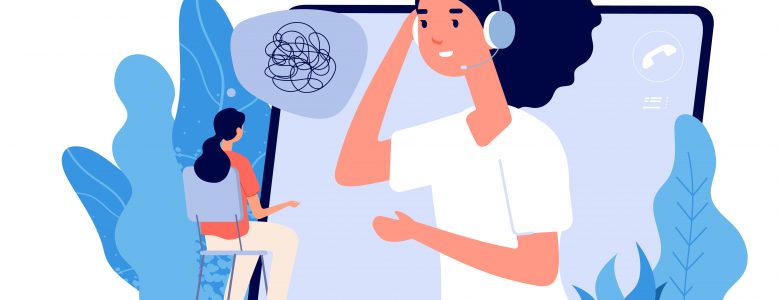August 27, 2020
How Online Counseling Can Help You Manage Quarantine Mood Swings

By: burgundy bug
Vector illustration of online counseling
Source: Adobe Stock
Summer’s over but the coronavirus pandemic appears to have no end in sight. Case numbers are still on the rise, schools change their plans for reopening every other day, social injustice continues to take more victims, and 10.2 percent of Americans remain unemployed.
Oh, let’s not forget to mention there’s an incredibly important presidential election looming over our nation, too.
Needless to say, 2020 has left us in a global fugue, confined to our homes and a prisoner of our minds, using moods like chalk to tally down the days spent in quarantine. After all, the varying emotions seem to be the only way to tell the days apart anymore.
Sponsorship Disclosure: This post was brought to you in part by BetterHelp, an online counseling platform that strives to expand access to professional, affordable, and convenient mental health care.
You can begin your journey towards better health by connecting with a licensed BetterHelp counselor that suits your needs.Thank you for supporting our community and for supporting so many around the globe through your services.
Although the Affordable Care Act has expanded access to mental health care tremendously over the last decade, Mental Health America says 10 million adults still aren’t receiving the mental health care they need.
Affordability, accessibility, and stigma continue to plague the nation during a vulnerable time in which We the People need mental health care the most.
Pandemics, Stress, and Quarantine Mood Swings
Note: If you or a loved one are currently having suicidal thoughts, please call the Substance Abuse and Mental Health Services Administration Hotline (1-800-662-4357) or National Alliance on Mental Illness Hotline (1-800-950-6264).
As the Centers For Disease Prevention and Control says on their site, “pandemics can be stressful.” But the emotional toll of COVID-19 extends beyond just “feeling stressed.”
Recent statistics from MHA show more than a quarter of a million people screened have displayed symptoms of depression and anxiety since the start of the pandemic.
“Collectively, since the end of February more than 263,000 people over and above what we would have expected have screened moderate to severe for depression or anxiety,” said MHA President and CEO Paul Gionfriddo. “This reflects how pervasive mental health conditions are becoming in the general population as a result of the pandemic.”
There are many factors driving the spike in depression and anxiety over the last few months. Examples from the screened respondents include:
- Loneliness and isolation
- Relationship problems
- Current events
- Financial stress
“Most worrisome are the 90,000 plus people who report regularly thinking of suicide or self-harm – more than 30,000 in the month of July alone,” Gionfriddo added.
Those who were already grappling with the ups-and-downs of mental health conditions prior to the pandemic are increasingly vulnerable right now.
Yet, even those who had never experienced depression before are faced with emerging cracks in their foundation.
Former first lady Michelle Obama even discusses experiencing “quarantine mood swings” and “low-grade depression” for the first time in her life in a recent episode of her podcast.
“I try to get a work out in, but there have been periods throughout this quarantine where I have felt too low,” Obama says. “Y’know, I’ve gone through those emotional highs and lows I think everybody feels where you just don’t feel yourself.”
Managing the Highs and Lows of Staying Home
It’s hard for anyone to feel like themselves right now. You’re not going out, you’re not seeing your loved ones, and no one really has control over the situation.
Every day seems to bring about a new headline or challenge, yet, when you look around, nothing’s changed — you’re still at home, in the same place you’ve been for the last few months.
And for many, being home hasn’t been all bad. It’s forced us to re-evaluate our hectic schedules and unbalanced lifestyles… But these changes have come about so abruptly it’s inevitably unnerving.
Online Counseling: Speaking Up to Let it Out
Vector illustration of an individual speaking to an online counselor through their smart phone
Source: Adobe Stock
The first step towards getting help is speaking up. Keeping your stress bottled up right now — during a period in which you’re already spending more time with yourself than ever — is the last thing you want to do.
Sure, you can talk it out with your friends here and there, but they’re all going through the same thing too.
Plus, your friends probably aren’t certified therapists or counselors. They’re not equipped with the tools needed to provide you with proper mental health care.
Speaking with an experienced, trained professional is the most effective route for receiving mental health counseling.
On BetterHelp, there are an array of accredited psychologists, marriage and family therapists, clinical social workers, and licensed professional counselors who will help you navigate the highs and lows of staying home.
The platform provides high-quality care at affordable rates during times that work best with your schedule. You’re able to connect with a counselor via instant messaging, audio, and video calls.
The counselor is there to carefully listen to your concerns, help you identify your emotions, and regain a sense of balance to your mental health.
Interested in having content featured in an upcoming blog post or issue of The Burgundy Zine? Head on over to the submissions page!
For all other inquiries, please fulfill a contact form.



